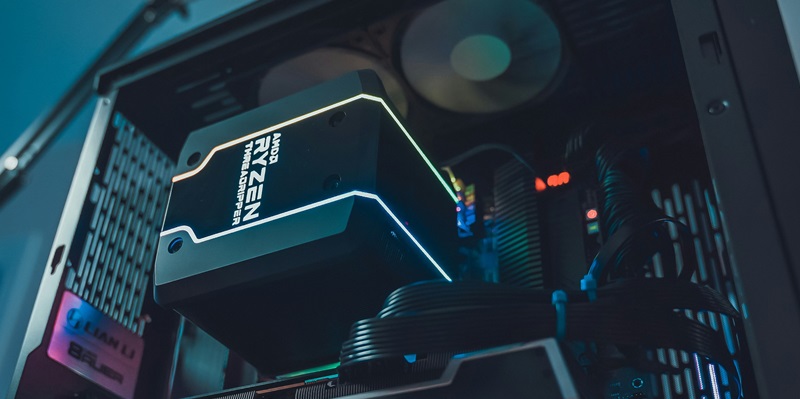The PC gaming world has been abuzz with the possibility that a bug in Windows 11 might be causing AMD’s Ryzen processors to underperform. This issue has become particularly notable in the context of the latest Ryzen 9000 series, where gamers and hardware enthusiasts have reported slight slowdowns in performance during gaming scenarios. Concerns about these discrepancies have driven a wave of recent analysis and investigations, aiming to uncover the root cause of the problem.
Initial Observations on Ryzen Performance
Recent analysis by Hardware Unboxed has revealed that AMD’s Ryzen processors, including the high-end Ryzen 9700X, have fallen short of performance expectations in gaming tests conducted on Windows 11. Specifically, the test results for these processors were a few percentage points lower than AMD’s own internal projections, sparking widespread interest in understanding the underlying reasons for this discrepancy.
The journey to uncover the cause required a detailed comparison of the testing methodologies employed. Notably, it was discovered that AMD’s internal tests had utilized a "hidden" system administrator account in Windows 11, as opposed to the standard local admin accounts used by most users and reviewers. This hidden admin account, which is not commonly activated and is typically intended for niche use cases and troubleshooting, appeared to offer a performance boost in gaming workloads, suggesting an underlying issue with standard local admin accounts.
Delving into the Hidden Admin Account
Further investigations showed that the hidden admin account possessed certain elevated privileges that local admin accounts lacked. When Hardware Unboxed replicated their gaming tests on the Ryzen 9700X using this hidden admin account, they observed a noteworthy performance improvement. For instance, Cyberpunk 2077, a game known for its demanding performance requirements, showcased a 7% increase in performance at 1080p when coupled with an RTX 4090 graphics card, a scenario that emphasizes CPU usage.
The findings were not restricted to a single generation of hardware. The previous-generation Ryzen 7000 series processors also demonstrated improved performance when tested under the hidden admin account, albeit with slightly less pronounced gains. On average, the Ryzen 9700X exhibited a 3.8% performance increase, while the Ryzen 7700X displayed a 2.6% improvement when benchmarked using this special mode.
Nuances of Bursty Workloads
The most marked performance improvements were seen in "bursty" workloads that are characteristic of gaming scenarios, where processing demands can spike suddenly and unpredictably. This behavioral pattern appears to underpin the issues observed in gaming environments. Applications with more sustained and prolonged workload demands, in contrast, did not show similar performance drops, thereby distinguishing the gaming performance issue from general computing use cases.
The enhanced performance under the hidden admin account ignited a discussion about whether the observed discrepancies were due to a fundamental bug in Windows 11 or simply a result of the unique privileges of the admin account, which might reduce overheads. Elevated privileges could potentially minimize interruptions or provide more direct access to resources, leading to smoother and more responsive CPU performance in gaming situations.
Broader Implications and Future Testing
Further testing is crucial to determine whether this performance issue is exclusive to AMD’s Ryzen processors or if it potentially affects other types of hardware, including Intel CPUs. Should the bug be identified as part of a broader Windows 11 problem, its correction could lead to significant shifts in performance benchmarks and user experience. While AMD leans towards the belief that this is a Windows 11 bug, concrete evidence is yet to be provided, necessitating more comprehensive evaluations.
It also raises questions about whether Windows 10 might suffer from similar issues and whether this could explain the recent benchmarks where Linux outperformed Windows 11 in gaming scenarios using Ryzen 9000 processors. These broader operating system-level differences hint at potential optimizations and inconsistencies that might impact future software updates and performance benchmarks. Resolving these issues could not only clarify the current state of processor performance but also inform future developments in the operating system by Microsoft.
Potential Risks and Precautions
Some users have reported instances where their gaming experience is not as smooth as expected, spurring further scrutiny. Many gamers rely on Ryzen processors for their high performance, so any dip in efficiency can be particularly frustrating. The bug’s nature and extent remain under thorough examination, with both Microsoft and AMD diving deep to identify and resolve the issue.
Industry experts are also weighing in, offering insights and conducting independent tests to confirm if Windows 11 is indeed the culprit. This scenario reminds us how crucial software compatibility is with hardware to ensure optimal performance. As investigations continue, the community remains hopeful for a swift resolution that restores the expected performance levels of Ryzen processors.

